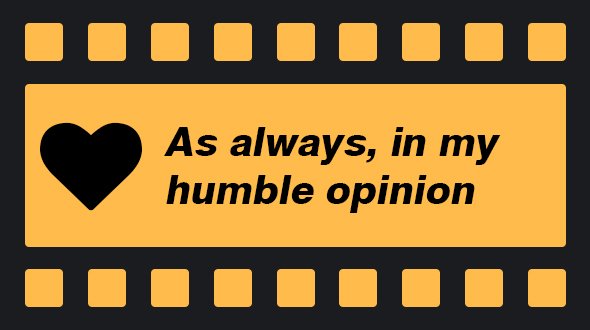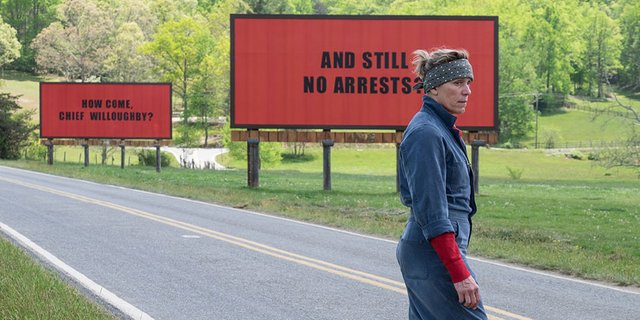"True Cinema" VERSUS "120 minutes long videos" --- "Three Billboards Outside Ebbing, Missouri"



Unfortunately, we live in an era where any video footage that is "long enough" is considered as "Cinema".
Fortunately, that doesn't mean the "Cinema" is dead.
And it's always a pleasure to see a wonderful piece of art like "Three Billboards Outside Ebbing, Missouri" - As you know, there are times when great story-writing, storytelling, acting and directing come all together! The FANTASTIC FOUR are at their best! (No, this is not about Marvel!)

[Photo Source] - There is a third billboard and it reads..: "Raped while dying". This is not a funny story.
I (lucky me) watched some REALLY good movies in 2017, and "Three Billboards Outside Ebbing, Missouri" (T.B.O.E.M.) was definitely one of my favorites. I was impatiently looking forward to watch it, mainly because of Frances McDormand (one of the best actresses of our time who we have the privilege to watch on screen) and the director / writer, Martin McDonagh (you may remember him from the movies "In Bruges" and "Seven Psychopaths").
I also have no doubt that Sam Rockwell (have you watched the great Sci-Fi, "Moon"?) will be remembered as one of the most unforgettable police officers in the history of cinema for his performance in "T.B.O.E.M."
Martin McDonagh has already proved himself more than enough as a writer and director. When it comes to movies (he's also a very respected playwright), his scripts are mainly based around the core idea of "the loss of a beloved one" and its natural consequences, the grief and the regret. I don't know if he has ever experienced such a heart wrenching loss, but it seems he has a lot to say about the matter. In his movies, the matter of loss is the absolute root of the most probable question..: "How she / he will deal with that?"... OR, to be more precise, "is it ever possible to deal with that kind of trauma?" You can also see a "similar" type of drama caused by a traumatic loss in "Seven Psychopaths", "In Bruges" and "Six Shooter" (a "short") too (all worth watching, but "In Bruges", "Six Shooter" and "T.B.O.E.M." are my favorites among his movies).
I don’t know anyone else who could have played Mildred. After I sent it to Frances McDormand I was literally thinking, "If she says no, we are f*cked!"
-Martin McDonagh [Source]
I'm sure you would agree with McDonagh's decision (and obsession) if you already have watched the movie but, I'll dare to repeat, Frances McDormand IS AMAZING! Thankfully, after a brief moment of indecision, Frances McDormand listened to her husband's (Joel Coen of the Coen Bros.) advice which was nothing more than a sentence..:
"Just shut up and do it!" [Source]
"T.B.O.E.M." is definitely a HURRICANE OF EMOTIONS. In one scene, you laugh, in another, your heart hurts from excessive pain; and the movie never stops doing that.
Mildred (Frances McDormand), a divorced mother of two whose daughter Angela is raped and killed in the most barbaric conditions, yet even after seven months there still isn't any progress on finding the perpetrator(s). Depressed and frustrated with grief and despair, she hires three billboards outside Ebbing, Missouri (not a "cheap" decision) to provoke local police force, in hopes of wider awareness and media coverage to achieve faster progress on the investigation. Meanwhile, Sheriff Willoughby (Woody Harrelson), a decent, respected, honest man of great will, does his best and truly cares about the fate of Mildred's daughter but he has his hands tied, because of the lack of any evidence caused by the nature of the crime (even writing these lines are terrifying; they not only raped and killed Angela but also burned her to wipe out any physical evidence)
"T.B.O.E.M." is built on clever details that we learn throughout the movie, and these details are the absolute locomotive of our emotional hurricane I was just talking about. We learn why the officer Dixon (Sam Rockwell) acts like the way he does (he learns to hate "colored" people from his mother; but of course, "racism" cannot be justified or legitimized no matter what his past was) and how he loves and respects Sheriff Willoughby, to a dangerous extent. Sheriff Willoughby's terminal cancer is not a secret around the neighbourhood which influences residents' support even more for him after the "billboards" incident triggered by Mildred. This is a movie where everyone has their own cause, whether be right or wrong, and characters are convincing thanks to their critical performances.
First half of the movie cleverly puts the puzzle down, and especially with the letters Willoughby has written prior to his suicide to his wife, Mildred and Dixon; the hurricane becomes stronger. And what a "kind" suicide it was, it might be the "kindest suicide" in the movie history. Without abusing the viewers emotionally (there is more than enough room for that when it comes to a character's suicide in a movie), Willoughby clearly states his reasons of his decision, one by one. All he wants to do is to have his family remember him with his best, as the loving father and husband they know for years. He even covers his face before shooting himself to prevent his family from seeing the horrible effects of a gun. As we've said, whether they be right or wrong, everyone has their own causes in Ebbing, Missouri.

[Photo Source] - When Mildred sees a fawn, YOU WILL CRY. I'LL GUARANTEE THAT.
What about the residents? They turn against to Mildred after what she did with these billboards to support Sheriff Willoughby, because of their emotions, because they love and respect him? Well, it might be natural and even understandable, but, what about a mother who seeks nothing but JUSTICE? When emotions and JUSTICE collide with each other, which side should we be on? JUSTICE! And one of the many good things "T.B.O.E.M." successfully achieves is that it clearly separates JUSTICE from REVENGE (especially in the final scene).
And I wonder, If these residents had learnt (like we've lerned from Willoughby's letter to Mildred) that Willoughby himself paid the bill for the billboards to keep them visible even longer, would their behavior be any different against Mildred? Maybe it's some sort of a social experiment and the movie itself wants to learn about our decision? But, does it even matter? Is it the point? And for the same reason, residents never learn the truth.
"PREJUDICES" - Are we innocent?
The moment we realize how Dixon's love is real for Sheriff Willoughby for the first time is when he hears about the terrible news of Willoughby's death. Devastated by the loss, Dixon, who is the main target of viewers' prejudices throughout the movie (and yet again for a reason: the movie is still on its mission), does exactly what viewers would expect from a character like him and beats Red (owner of the company which is responsible for the Billboard ads), almost to his death (not a "good" way to show respect, gratitude or love for a beloved one, for sure). But his true crossroad in life comes when he reads the letter of Willoughby to him, which clearly states that the true salvation in life lies in "love", not "hatred". From this point, we clearly understand that Willoughby was much more than a friend to Dixon, an idol and a father figure, because that exact moment is the beginning of Dixon's own journey to become a "good" man. His efforts to save Angela's (Mildred's murdered daughter) case files from the burning police station was deeply touching (guess who has burned the station?)
The movie criticizes the law system (we have a suspect thanks to Dixon's self-sacrificing dedication to his new "mission", but the system refuses to investigate the suspect further because of him being an ex soldier), racism, discrimination and social stigmas; and the "GREYNESS" of the characters is a huge bonus to the power of the story. You think Mildred, the mother in despair and pain, is a role model? Definitely not, as James (Peter Dinklage, Tyrion Lannister of "G.O.T") once states in their so called date when she hurts his feelings, she's not even kind! No, Mildred doesn't have the obligation of acting as a role model for the observer, she's just a mother in her own way who does what she thinks is right. And yet we see the goodness and compassion of her heart when Willoughby unintentionally expectorates to her face because of his terminal illness. You see it in her eyes, she truly cares about him.
This is also a movie of apologies, in each characters' own way, for sure. Willoughby apologizes to Mildred for not being able to find the perpetrator, Dixon apologizes to Red for beating him (and Red accepts it by offering an orange juice to him in hospital). Their apologies are sincere and we the viewers, know that.
The conversation between Mildred and Father Montgomery was truly epic!
Oh, and that scene where Mildred sees a fawn, as I've said before, that's where your heart will definitely hurt a lot. You'll cry. I'll guarantee that.
Have you watched it? Please never hesitate to share your thoughts!